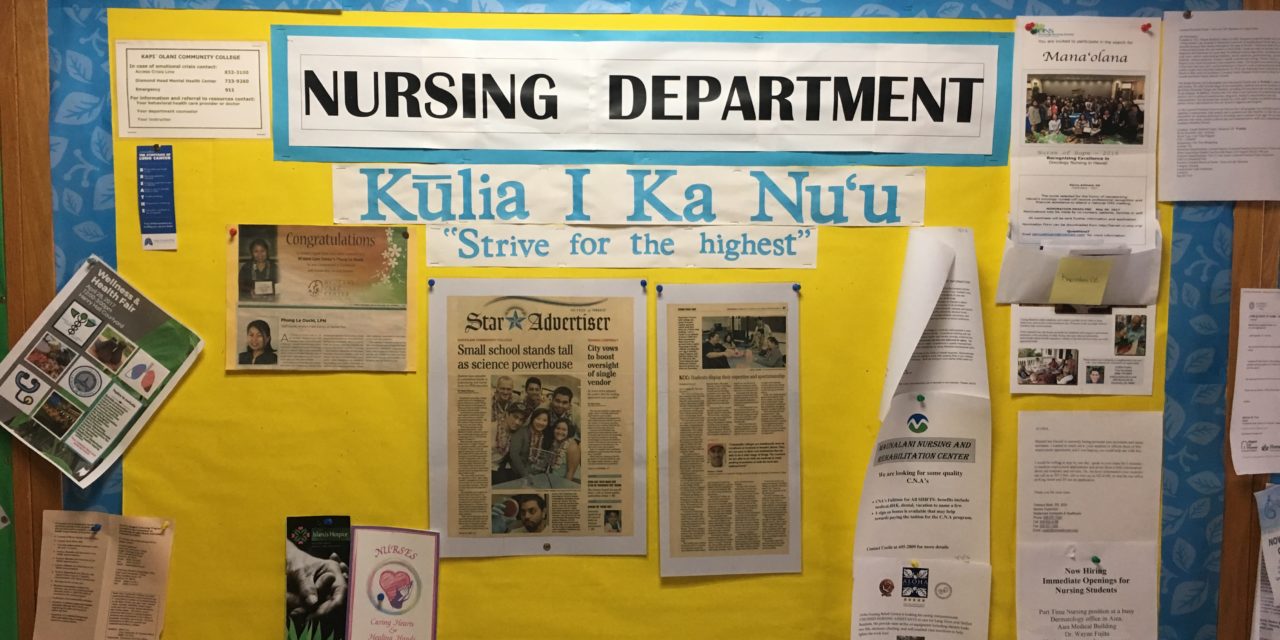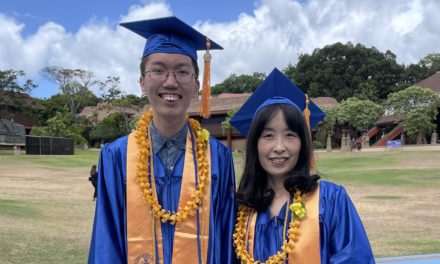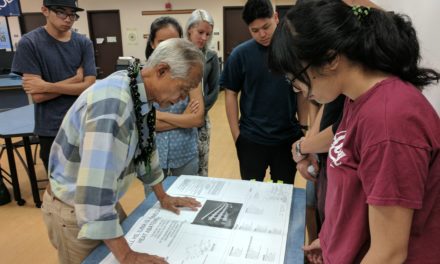BY KAYLA VALERA | STAFF WRITER
Before the end of the spring and fall semesters, KCC students who have applied for one of the six nursing programs expect a letter to see whether or not they have been admitted into at least one of the exclusive programs.
These programs include the Associate’s Degree in Nursing (ADN) Program, the Practical Nursing Program (PRCN), the Associate’s in Science Degree – which leads to the Registered Nurse (RN) License, Adult Resident Care Home (ARCH) Program (for nurses who want to open up their own care home), the Surgical Technology Program, and the Long-Term Care Nurse Aide.
Of the six, only the ARCH and Long-Term Care Nurse Aide select those who are “first qualified,” or applicants who have completed their application on time and have met the English reading requirement that’s necessary for the course. The rest of the programs choose applicants that are “best qualified”.
Out of the 200 or so who apply for the Associate’s in Science Degree for Registered Nurses (RN) program each semester, only the top 20 are chosen. The reason for this being is that KCC’s student-teacher ratio in the program only permits a certain amount of admitted students each semester. This strict cap on students makes KCC one of the most highly competitive nursing programs in the state– rivaling some four-year universities.
There is, of course, a waiting list that holds out for accepted students who decline the program at the last minute. In instances like these, pre-nursing counselor Wes Maekawa urges those who are waitlisted to “be ready for the call, even if you’re drafted from the list a week before school starts.”
According to the Nursing Associate’s in Science Degree FAQ page, the criteria that these “best qualified” applicants must meet is based on their holistic records, in order to see who can fare through the rigorous program. What is analyzed are the students’ grade point average (GPA) based off of the prerequisite courses that they’ve completed, the adjusted individual total score that they receive from the Assessment Technology Institute’s Test of Essential Academic Skills (ATI-TEAS) exam, as well as any prior medical experience/training.
Because students’ points are highly factored into their acceptance, students are encouraged to try and exceed the average that are usually ranges amongst those who they are competing with. For example, the average of GPAs that one must meet in general for acceptance would have to be around 3.5-3.6. In terms of scores for the ATI-TEAS exam, which is out of 100, the scores would vary depending on certain programs. For example, those pursuing a position in the ADN program would need to score at around the 80s, while those pursuing Practical Nursing would need to hit at least a 70.
John Aiwohi, who is 44-year-old junior at Chaminade’s four-year nursing program, has gone through the hoops of taking nursing prerequisites at KCC, only to be placed on the waiting list after he applied for the RN program in the spring of 2015.
“I have always liked helping people and being a part of the solution,” said Aiwohi on why he was inspired to pursue a career in nursing.
Returning to school after two decades, Aiwohi decided to enroll in KCC in the spring of 2013 to get his feet wet and steadily acclimate to college. Aiwohi said that while taking his prerequisites for the Nursing program, he enjoyed the individualized attention provided at KCC and the manageable workload.
Although he was able to produce a 3.8 GPA within his two years at KCC, Aiwohi realized that his classmates who pulled a 4.0 GPA and had previous internships/work experiences would be the ones to surpass him in the cutoff. Aiwohi figured that he shouldn’t put all of his eggs in one basket and additionally applied for the HPU and Chaminade nursing programs as well.
Because he got accepted for both HPU and Chaminade, but was waitlisted at KCC, Aiwohi decided that the best path to go through for his nursing career was to continue at Chaminade due to its less competitive Bachelor of Science in Nursing (BSN) program. There, Aiwohi wouldn’t have to fight so hard for a space in a class since, as Chaminade’s website explains, freshmen don’t have to reapply or compete for placement throughout the next four years.
Aiwohi states that although there was still some some stress and anxiety surrounding his application into Chaminade’s nursing program, the security of having a spot throughout the course of the program has helped him to focus solely on obtaining his BSN. Afterwards, Aiwohi plans to transfer back into the UH system and pursue a Doctorate of Nursing Practice (DNP).
For those who have been rejected from the program of their choice, Maekawa suggests taking an alternative route to reapplying for the next semester. Instead he encourages those to consider going up the “career ladder.”
The sequence that it would start from for those who are interested in pursuing this route is by first getting into the A.A. Nursing Aide program. Then afterward, students will work their way up through the Practical Nursing Program, up to applying for the A.A. in Science Degree for R.N. This approach takes at least up to 2.5 academic years, in which 1 academic year includes three terms (fall, spring, and summer).
Vanessa Ranon, who is the current president of the Board of Student Activities (BOSA), is pursuing this method. She has always been interested in nursing since having trained at the Pali Momi 3-month internship nursing program in her sophomore year at James Campbell High School.
“One of the reasons why I came to KCC is because I covered their nursing program in my senior year of high school for a school project,” said Ranon. “It talked about how it could help to bridge off into Mānoa’s program as well.”
Having been at KCC since Fall 2014, Ranon has finally gotten accepted into the Nursing Aide Program for the semester of Fall 2017. Over the course of her academic career she hopes to even branch out into the UH system to earn her BSN through KCC’s auto-admit from A.A. Nursing Degree for RN.
Once students get into one of the programs, they will be met with the assistance of two pre-nursing counselors, Maekawa and Crystalyn Hottenstein, to help students map out their training goals and training. These counselors also try to reach out to students by conducting nursing information that occur at least 2-3 times a month. The time frame for each session is different and starts either at 9 a.m., 1 p.m., or even as late as 5:30 p.m.
At KCC, these sessions are usually held at the Kōpiko building 241-242, or 209. At LCC these sessions take place at the campus’ Health Science Complex. The schedule for these in-person events can be found here, while those who aren’t able to attend can check out the powerpoint presentations with the counselors’ voice overs on the official YouTube Channel here. For those who have more personal questions, about their application and a certain pathway they want to pursue, there are always walk-in appointments that students can attend from Wednesdays at 1-4 p.m. and Thursdays at 9 a.m.- 12 p.m.
For those who are interested in KCC’s Nursing Program of have any further questions, email either Maekawa or Hottenstein at kapnurs@hawaii.edu.






